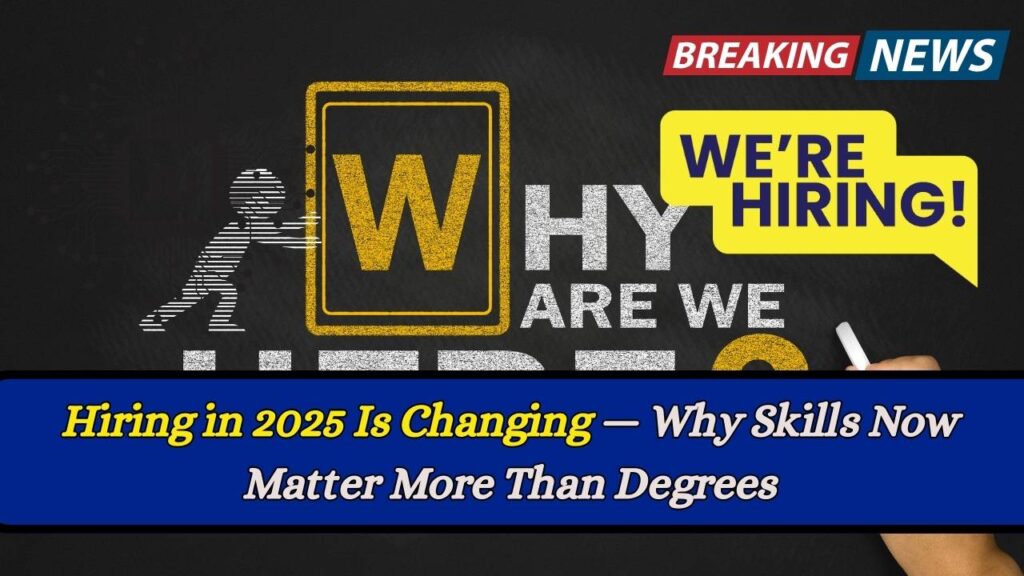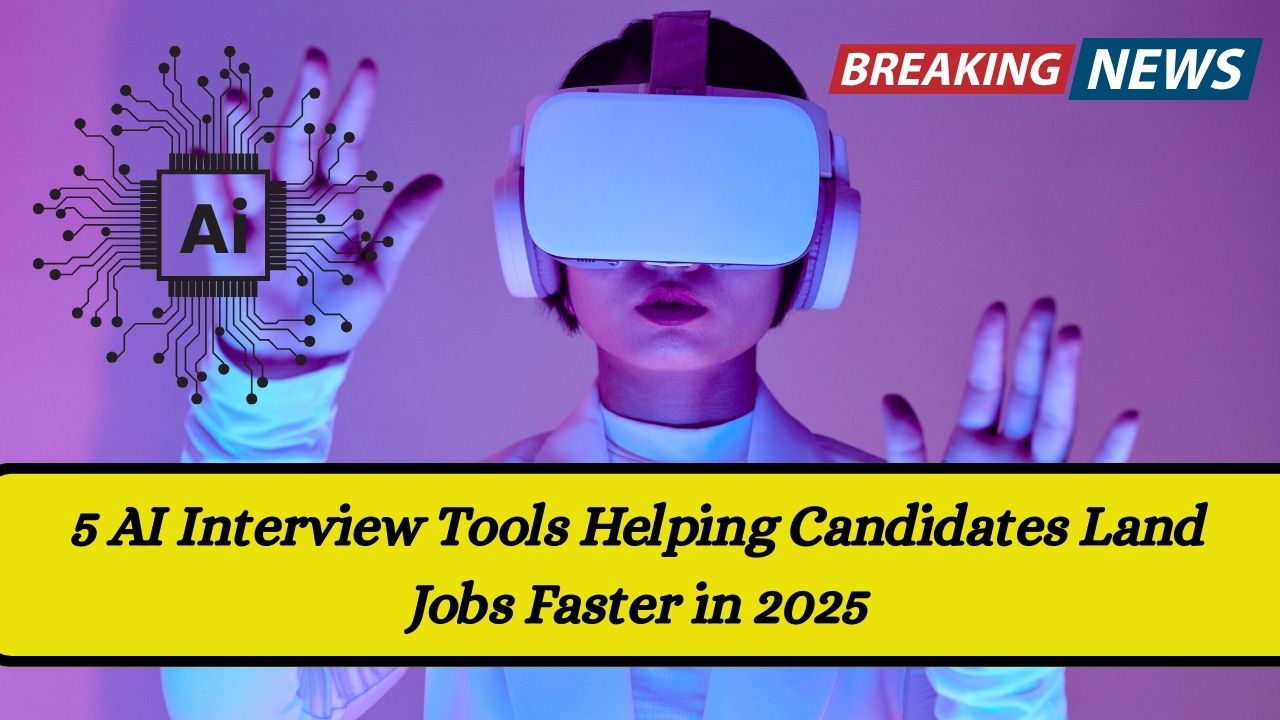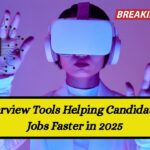Hiring in 2025 Is Changing – The job market in 2025 is undergoing a major transformation. Employers are shifting away from traditional qualifications and placing more value on what you can do rather than what certificate you hold. Skills-based hiring is no longer a buzzword—it’s the new norm. This shift is rewriting job descriptions, recruitment strategies, and even educational pathways.

Whether you’re a student, job seeker, HR professional, or CEO, it’s essential to understand why this trend is happening, what it means for the future of work, and how to adapt.
Hiring in 2025 Is Changing
| Topic | Details |
|---|---|
| Trend | Skills-based hiring replacing degree-focused recruitment |
| Why it matters | Employers find skills a better predictor of job success |
| Industries leading the shift | Tech, healthcare, skilled trades, green energy |
| Employer examples | Google, IBM, Apple, Deloitte |
| Candidate tip | Showcase real-world projects, portfolios, and certifications |
| Data point | 90% of firms report better hires from skills-based recruitment (Forbes) |
| Official Resource | Forbes Report on Skills Over Degrees |
In 2025, your skills—not your degree—will open the door to your next opportunity. Focus on what you can demonstrate, not just what you studied. This trend promotes inclusion, efficiency, and real capability.
Why Are Degrees Losing Their Grip?
For years, a university degree was considered the golden ticket to a good job. But as job requirements have become more dynamic and technology-driven, employers have realized that degrees don’t always predict performance.
According to Unleash.ai, 51% of hiring managers now prioritize skills over degrees, job titles, or years of experience.
What’s Driving This Shift to Skills-Based Hiring?
1. Rapid Technological Advancements
Jobs are evolving faster than traditional curriculums. Fields like artificial intelligence, cybersecurity, and data science require up-to-date, practical knowledge.
2. Labor Market Shortages
Sectors like healthcare, green energy, and skilled trades face a chronic shortage of qualified workers. Companies can’t afford to overlook capable individuals just because they lack a degree.
3. Push for Inclusion and Equity
Degrees often exclude candidates from lower-income backgrounds. Removing degree requirements helps companies attract diverse, non-traditional talent and reduce hiring bias.
4. Real-World Performance Over Theory
More employers are discovering that real-world results matter more than academic credentials. Portfolios, assessments, and work trials now carry more weight.
5. Cost and Accessibility of Higher Education
College degrees are expensive. In many regions, the rising cost of education creates barriers. Employers recognizing this are choosing to focus on demonstrated skills.
6. Government Policy Support
In several countries, governments are incentivizing apprenticeship programs, vocational training, and employer-funded upskilling, legitimizing skills over degrees.
Industries Embracing Skills-Based Hiring
Tech Sector
Big tech companies like IBM, Google, and Apple have dropped degree requirements for many roles. Instead, they conduct skills tests, coding interviews, and project evaluations.
Healthcare
Practical certifications and hands-on experience are increasingly valued in nursing, medical technology, and allied health roles.
Skilled Trades
From electricians to plumbers, companies are offering six-figure salaries to high school graduates with trade certifications. According to the Wall Street Journal, some teens are landing $70,000/year jobs right out of high school.
AI and Green Jobs
Emerging sectors like AI, robotics, and renewable energy are prioritizing agile learners. According to arXiv.org, there is a notable decline in degree requirements for AI-related jobs.
How Can Job Seekers Adapt in 2025?
1. Upskill Continuously
Use platforms like Coursera, Udemy, LinkedIn Learning, and edX. Focus on certifications that demonstrate your abilities.
2. Build a Strong Portfolio
Showcase your work on GitHub, Canva, Notion, or personal websites.
3. Master Self-Branding
Use LinkedIn to tell your story. Share your problem-solving experiences and outcomes.
4. Practice Real-World Scenarios
Be prepared to complete practical tasks or simulations in interviews.
5. Use Micro-Credentials and Digital Badges
Show off verified digital credentials to validate specific skills.
6. Join Skill-Based Communities
Engage with communities like GitHub, Behance, Stack Overflow, and relevant LinkedIn groups.
What Should Employers Do to Embrace This Trend?
1. Rewrite Job Descriptions
Focus on required skills instead of defaulting to degrees.
2. Use Skills Assessments
Platforms like Codility, HackerRank, Vervoe, and others assess real competencies.
3. Invest in Learning & Development
Upskill current employees and build future leaders internally.
4. Recruit from Non-Traditional Channels
Look beyond colleges. Explore bootcamps, online communities, and upskilling platforms.
5. Track Skills Analytics
Use software to manage skill inventories and identify talent gaps.
Real-Life Success Stories
- Salesforce uses AI career coaches to guide internal mobility (Business Insider).
- Deloitte recruits high school graduates via paid apprenticeships.
- Silicon Valley startups are giving $100K checks to talented non-degree holders (NY Post).
DRDO GTRE Hiring Apprentices in 2025—Full Notification, Eligibility, and Application Link Inside
BPSC Hiring Assistant Engineers in 2025—Complete Guide to Eligibility and Application Process
GAIL Hiring Full-Time FMO in 2025—Earn ₹93,000 Monthly with Benefits, Check Eligibility
FAQs about Hiring in 2025 Is Changing
Q1. Does this mean degrees are now useless?
No. Degrees still matter in fields like law, medicine, and academia.
Q2. What kind of jobs don’t require a degree anymore?
Roles in tech, design, digital marketing, customer support, and skilled trades.
Q3. Where can I learn these skills for free or cheap?
Platforms include Coursera, edX, Google Career Certificates, LinkedIn Learning, and YouTube.
Q4. Can I switch careers without going back to college?
Yes, through certifications, practical projects, and mentorship.
Q5. How can I prove my skills to employers?
With portfolios, GitHub projects, freelance work, and simulations.
Q6. Are employers really hiring people without degrees?
Yes. Companies like Google, IBM, Deloitte, and Salesforce have formalized skills-first hiring policies.







